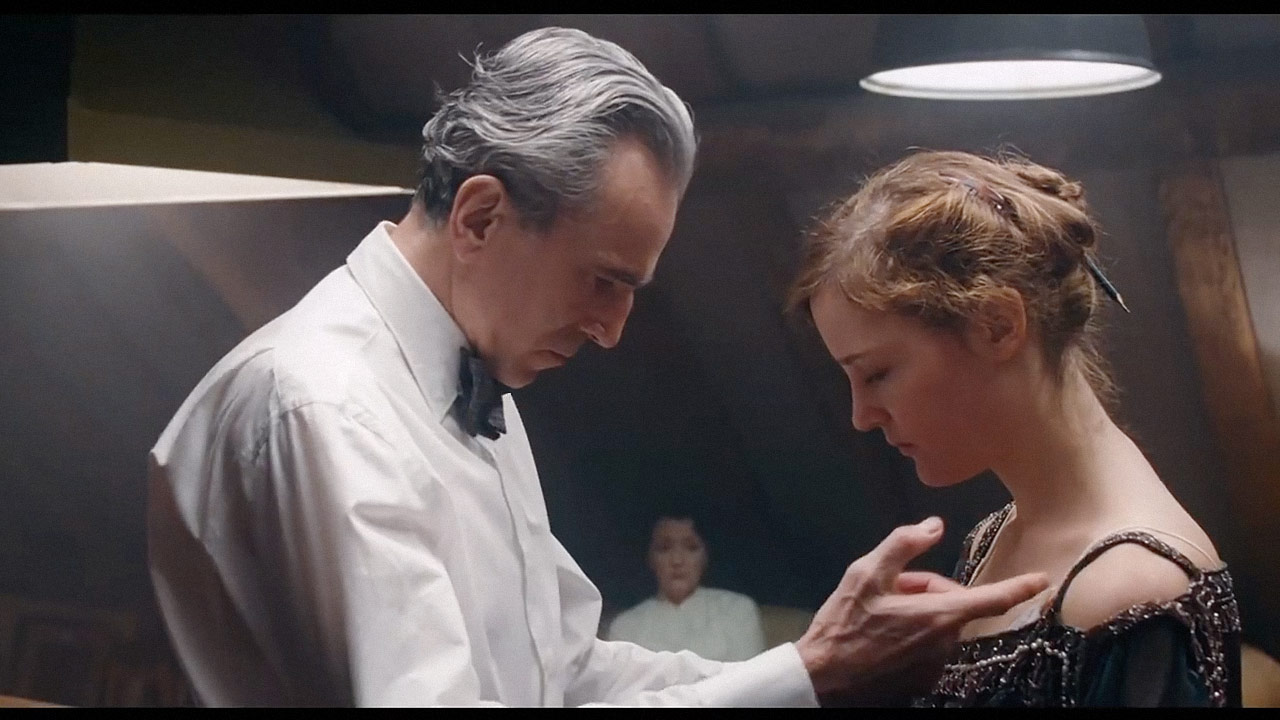
It is always refreshing when a movie nominated for Best Picture at the Oscars doesn’t fall into one of the pigeonholes generally reserved for awards glory. This year, Phantom Thread shares that distinction with Three Billboards Outside Ebbing, Missouri, The Shape of Water and Lady Bird. And while Phantom Thread is not as unique a story as those other films – we have seen dark romances where partners tug at the strings of each other’s psyche before, it’s still a brilliantly made film NOT directly about race, class, gender, disability, war or politics that leaves a very nice taste once you leave the theatre.
What strikes you very early on in the movie is the humour. This is fine dark comedy. A movie about a posh fashion designer in posh 1950s London does not smell like the recipe for much laughter, but the (b)looming romance between a disciplined, sophisticated, perfectionist and a somewhat confused, somewhat unsophisticated waitress surprisingly leads to many funny exchanges. This is not laugh out loud funny. This is not even the kind of mutter-under-your-breath kind of realistic funny that you see in, say, The Big Sick. This is pure clash of personalities, or more importantly, clash of priorities. We laugh at Reynolds Woodcock’s fastidious craftsmanship and obsession with routine rubbing incongruously against Alma’s free-form, happy-go-lucky, need for love and attention. You laugh simply at how the situation is stacked (example: this scene), and you do this in no small part because of the fantastic performances.
I confess to my sin of never really having seen Daniel Day-Lewis’s genius (but then, I’m also the idiot who had never seen a Paul Thomas Anderson movie before this). I’d only ever seen him in Lincoln before this, and that performance had floored me. What he does here is every bit a stroke of genius, if not every bit as impressive or as impactful as him playing Abraham Lincoln. His voice and glances and his movements as a designer hard at work are a treat to watch. But he has an excellent comrade-in-arms in the form of Vicky Krieps. As Alma, she owns the vulnerability, the delicateness, the ‘being in over your head’, and then also, the bravery, the revolt, the standing up for herself, and the darkness, that make up her fascinating character. It is surprising that her performance is not getting the attention it deserves. Krieps and Day-Lewis play off of each other to fabulous results in delicate scenes such as where he is taking her measurements much to her glee but soon much also to her discomfort, and also, a raw, no holds barred, dinner table argument. The latter, as much as it involves the chemistry of both actors, belongs to Krieps. It is a delight to see her less sophisticated (and presumably less articulate) self trying to find both the words and the courage to locate exactly how she is being treated badly. Here’s a snippet from that marvellous scene, which beats even the heavy-duty acting on display in the La La Land dinner argument scene.
Must also mention Lesley Manville as Day-Lewis’s sister, a lone wolf performance composed mostly of silent surveillance of what’s unfolding from one corner of the room. She deserves her Best Supporting Actress Oscar nomination simply for her marvellous restraint in depicting a simmering frustration in this scene where she confronts her brother with the question of Alma’s future in the household.
It was also a pleasant surprise to see that Krieps’s good-girl character could take an unpleasant turn, too, when the need arose. She poisons Woodcock and works hard to not let him see a doctor, so that she can be his only saviour, and so she can savour all his attention towards her. One does not usually expect that from a character with the kind of basic ingredients that were set up for Alma.
The film has a great aesthetic voice, as one would expect from a movie set in the couture world (two-minute trivia video about this: here). It also has excellent posh-sounding music composed by Jonny Greenwood. They drive home very well the luxury and ostentation that form the world of Woodcock, and the world Alma is trying to fit in (or trying to occasionally slip Woodcock out from). I have not much of an eye for fashion (several people around me would testify to that), but when I was presented with this shot, I audibly uttered “Wow”:

The Costume Design and Original Score nominations are well on point.
“Whatever you do, do it carefully”, Alma tells Woodcock early in the story. What they both do is quite the opposite. But eventually, no amount of recklessness in treating the other person can separate them. The unseen thread that holds these two dark individuals together twists and twirls without understanding – but it does hold them together.
All in all, not the best movie I saw from 2017, but a dark romance executed extremely well. A satisfying watch. Which, the acclaim for this movie reveals, is sometimes enough to be called one of the best pictures of the year.
One thought on “The Best Films of 2017: “Phantom Thread””